Gravity
Gravity is a force that pulls objects toward each other. It is what causes objects to fall to the ground and what keeps the planets in orbit around the sun. Gravity is one of the fundamental forces of nature and is responsible for many of the phenomena we observe in the universe.
Key Concepts
- Force of Attraction: Gravity is the force of attraction between objects with mass. The greater the mass of an object, the stronger its gravitational pull.
- Acceleration: All objects near the Earth's surface experience a constant acceleration due to gravity, which is approximately 9.8 meters per second squared (m/s2).
- Orbit: Gravity is what keeps planets and other celestial bodies in orbit around larger objects. It is a centripetal force that acts to pull objects into a circular or elliptical path.
- Universal Law of Gravitation: Sir Isaac Newton formulated the law of universal gravitation, which states that every mass attracts every other mass with a force that is directly proportional to the product of their masses and inversely proportional to the square of the distance between their centers.
Effects of Gravity
Gravity has several important effects on the behavior of objects:
- It causes objects to fall toward the Earth when dropped.
- It gives weight to objects. Weight is the force exerted on an object due to gravity, and it is directly proportional to an object's mass.
- It influences the motion of celestial bodies, such as planets, moons, and stars.
Study Tips
When studying gravity, it's important to understand the key concepts and effects of this fundamental force. Here are some tips to help you master the topic:
- Review the concept of force and how it relates to gravity.
- Understand the difference between mass and weight, and how they are related to gravity.
- Learn about the history of our understanding of gravity, including the contributions of scientists like Isaac Newton and Albert Einstein.
- Explore the effects of gravity on the behavior of objects in everyday life and in the universe.
- Practice solving problems related to gravity, such as calculating the force of gravity between two objects or determining the weight of an object on different planets.
By mastering these key concepts and taking the time to practice problems, you can develop a solid understanding of the force of gravity and its effects on the world around us.
[Gravity] Related Worksheets and Study Guides:
.◂Science Worksheets and Study Guides Third Grade. Weather
Study Guide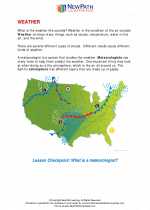 Weather
Weather  Worksheet/Answer key
Worksheet/Answer key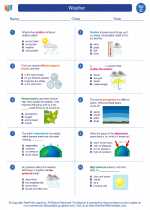 Weather
Weather  Worksheet/Answer key
Worksheet/Answer key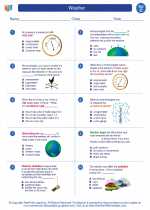 Weather
Weather  Worksheet/Answer key
Worksheet/Answer key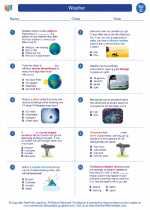 Weather
Weather  Vocabulary/Answer key
Vocabulary/Answer key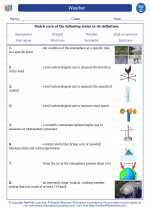 Weather
Weather  Vocabulary/Answer key
Vocabulary/Answer key Weather
Weather 

 Worksheet/Answer key
Worksheet/Answer key
 Worksheet/Answer key
Worksheet/Answer key
 Worksheet/Answer key
Worksheet/Answer key
 Vocabulary/Answer key
Vocabulary/Answer key
 Vocabulary/Answer key
Vocabulary/Answer key

The resources above cover the following skills:
EARTH AND SPACE SCIENCE (NGSS)
Earth’s Systems
Students who demonstrate understanding can:
Represent data in tables and graphical displays to describe typical weather conditions expected during a particular season.